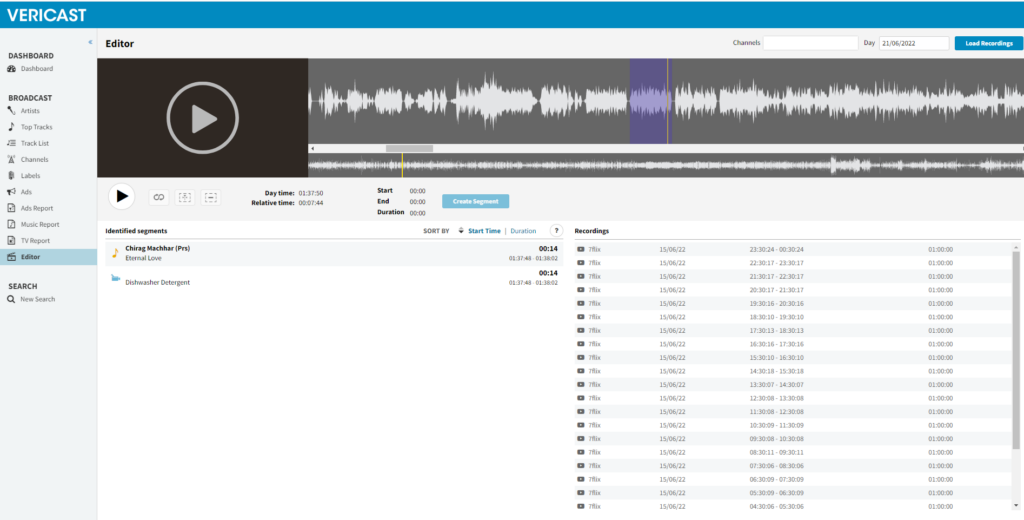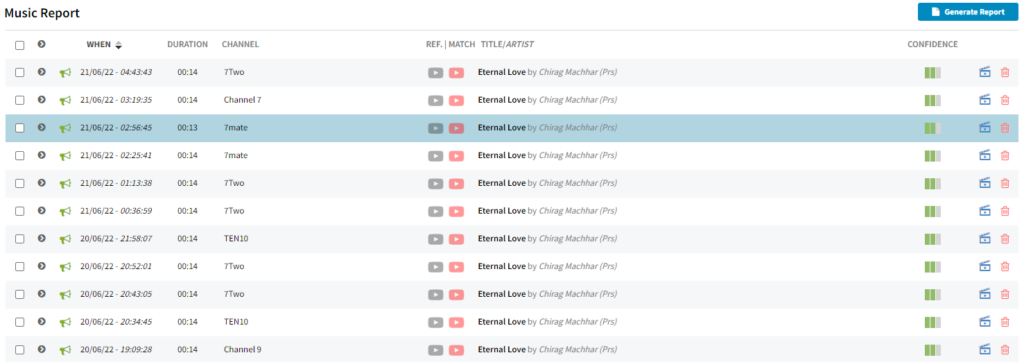We’ve been working with the UK-based music publishing company The Nerve since 2021. A few months back, we asked about how they employ Vericast to make the most of their craft. They now have another story they’d like to share with the world, so we happily did a second interview with Scott Pearce, one of the founders.
Read the first part of our interview with the Nerve here.
We’ve noticed you’ve recently caught a few unlicensed usages of your work outside of the UK and heard it was quite a ride. We’d love to hear all about that.
Our core business is TV and mostly in the UK, so it’s great to see our work travelling to other territories. We’ve been talking to the team at BMAT about extending Vericast to track TV coverage in other countries like Australia and New Zealand, so this example happened right after we started the trial.
We kept seeing this lone, single track dominating the airwaves, constantly coming up on random TV channels. We thought it was worth checking out, so we went on Vericast to replay the videos where our music was identified and to see if it was indeed ours. We’ve discovered that one of our works was featured in a dishwasher soap commercial for a big brand.
We initially identified around 500 plays across the channels, and then we saw that the track had around 1500 plays in just a few days afterwards – that’s about 6 hours on high-rating TV channels and quite some money.
What are the steps you had to follow to trace down the usages of your work? Was it straightforward or not so much?
First, we checked in-house to see if any of our people had licensed it, which they had not, and so then asked Jeff Ble, our BMAT contact point, for advice. He did some research and found out more about the commercial and the creative agency that had produced it, also providing us with the intel we needed to trace it all down. We already had the video evidence, so we were off to a great start.
We eventually found out that when a large music agency acquired a few smaller companies around the world, one of them had licensed this deal, but the person who handled it got sick and never got the chance to put the paperwork in the system. It took a few weeks to track it down, but we now have all the data we need, and they have also sorted out the licence.
Long story short, with Vericast data, video evidence, and Jeff’s help, we solved this issue quickly and also assisted the agency in registering our work, so it was a win for everybody.
The publishing process in advertising doesn’t always involve music publishing companies. In some territories you have to submit a claim with evidence to the rights societies to collect your public performance for ads, so we now have video evidence that we can forward it to the societies where we identified the usage – just to be ‘belt n’ braces’.
What’s the best part of the story?
The nicest part of the story is telling the composer that their work was featured on TV in an ad campaign and that there is a nice licence fee on its way. In this case, he’s a really young composer, he came to study music in England from India – a brilliant musician and a lovely guy. Discovering this usage of his work is super important to him and to us, as this is not an insignificant sum. Also, the fee essentially covers the entire BMAT subscription for one year – don’t tell Jeff – and with the extra cash we were able to extend the territories we monitor via Vericast.
Also, we share the music usage reports and the intel BMAT gives us daily with the composers. It’s a great motivational factor for all of us, and some of our young composers even show it to their parents. It’s a very competitive environment and it’s hard to see all of your usage around the world across all the channels and platforms. Being able to see the results of your work in real time and then being able to share this is a huge plus for all involved.
Proper and accurate reporting, as well as constant access to clean metadata with additional evidence to back up our claims, help us improve our efficiencies and empowers rights holders to take action when required, which has a positive knock-on effect on everyone in the music chain.
What’s the most convenient aspect of accessing Vericast data?
Other than ‘following the money’ one can use the data for A&R purposes, seeing actual usage ‘live’ and marrying the types of tracks to the types of shows, both locally and globally. There are always happy surprises in the reports and I often watch the video supplied by BMAT to see a particular track against a type of scene – sometimes it sparks new ideas and perhaps gives you a new idea for meta-tagging certain types of music. It’s always fascinating to see how others interpret your work and how they utilise it in their films, often it can be quite unpredictable, which is great.
What’s the best piece of advice for small music publishing companies?
Look after your talent. Music publishing has always been a leaky bucket, so solutions like Vericast make all the difference in the world. Investing in tools that allow you to improve efficiency is essential, and nowadays, most services are scalable – you can opt for various packages, and these services are much more affordable than they were just a few years ago, you don’t have to be a large company with deep pockets to utilise them. Likewise, you don’t need to be a tech genius to work with the data that BMAT provides. It’s good for businesses large and small.
Anything else you’d like to share with us?
Below are some Vericast print screen examples from the ad we tracked in Australia, with customer details redacted, if this is of any help or use – proof that I’m not taking bribes from Vericast.
Jeff, leave the bag of cash just here, thank you.


Find out more about how Vericast is giving publishers around the world higher visibility of their music so they can cash in on every usage.
Latest articles
November 19, 2025
Inside BMAT DSP Processing: How SIAE turned operational clarity into stronger licences and faster distributions
Some relationships last because they work, others last because they grow. For more than 10 years, we believe the partnership between SIAE and us has done both. Across products and people, w [...]
October 9, 2025
KODA and BMAT Announce Landmark Global Partnership for Music Rights and Royalties Management
BMAT, a global leader in music technology and rights and royalties data, is proud to announce a new partnership with KODA, the collecting society for songwriters, composers and music publis [...]
March 26, 2025
Inside ReSol: An interview with SACEM on rethinking how digital claiming conflicts are resolved
Much like family gatherings, the intricate world of digital music rights is no stranger to conflict. With frequent occurrences like overlapping ownership claims, metadata inaccuracies, lice [...]